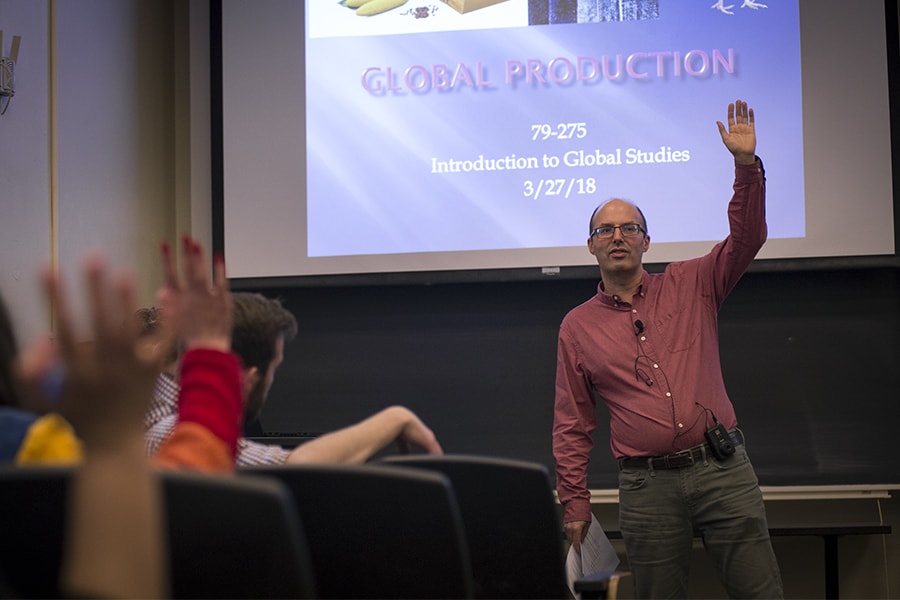
Deconstructing Inequality
By Stefanie Johndrow
Media Inquiries- Dietrich College of Humanities & Social Sciences
- 412-268-1788
First-year Carnegie Mellon University students are examining different demonstrations of inequality as part of the Dietrich College of Humanities and Social Sciences' Grand Challenge Seminars.
The seminars are designed to tackle complicated societal problems from multiple angles and perspectives. Paul Eiss, associate professor of anthropology and history, Mark Kamlet, provost emeritus and University Professor of Economics and Public Policy in the Dietrich College and Heinz College of Information Systems and Public Policy, Kody Manke, assistant professor of psychology, and Kathy M. Newman, associate professor of English, are coming together to explore inequality across their areas of expertise.
"In my own research on the relationship between culture and the economy, as well as my political work on public school funding and local elections, I have become increasingly aware of the pernicious effects of income inequality in the United States. That is what inspired me to put together a team of faculty to teach this course," Newman said.
Students are learning how inequality has emerged as a social and political problem in the 18th and 19th centuries and how it has re-emerged as a key concept for current socio-political movements. According to several studies, the gap between the rich and the poor in the U.S. is wider than in any developed nation. On a global scale, eight men own as much wealth as half of the world's population.The course also focuses on the future and with the potential of increased automation and the elimination of human jobs.
"My favorite part of the course so far has been the amount of discussion and interdisciplinary conversations we've been having," Melanie Kerber said. "Inequality is an important topic that affects all of us in our day-to-day lives, and it is often something that we are unable to discuss in larger lectures."
Kamlet focused on the potential impact of new technologies on human jobs and how they may well prove to be one the biggest challenges.
"Complex problem solving skills, higher order social and emotional capabilities, are important for 'technology proofing' careers," Kamlet said. "The humanities may — should, in my opinion — play a central role in instilling these characteristics."
The economics aspect and class structure appeal to Anirudh Narayanan, who is planning to major in economics.
"The feature of the class that I find the most interesting is the different special activities that we have every few weeks to further advance our development of the topic at hand," Narayanan said. "Each of these events have helped to emphasize many points made in our lecture, while providing an enlightening and entertaining method that our entire class is able to see together."
Newman used Edith Wharton's "The House of Mirth" as a focal point for cultural studies. Newman said the novel is emblematic of the Gilded Age, which took place between the end of the Civil War and the beginning of the 20th century. She said it was the last time the U.S. had a similar gap between rich and poor as today.
"The moral of the novel is that inequality is bad for the rich and the poor, a message that I think still holds up," Newman said.
Eiss had students produce an archive of global inequality. Each student researched a commodity produced and circulated internationally and used it as a window to the relationships between distant parts of the world.
"This course is good for students as well as for faculty to have context where they can think across different disciplines and approaches," Eiss said.
Manke gave inequality a different perspective by focusing on the situation of inequality in America's racial and socioeconomic facets., focusing in particular on inequality along racial and socioeconomic lines.
"I chose the areas of education, criminal justice and housing because they are very clear examples of how people's identities - things like their race, their gender, the amount of money their families make - play important roles in the way their lives play out," Manke said.
For Josh Pinckney, this interdisciplinary discussion is the reason why selected the seminar.
"There's never been a more unique time to examine this issue," Pinckney said. "I really appreciate that the course examines inequality through multiple academic disciplines. To me that exemplifies that the world's biggest problems are solved at the intersection of different fields when experts cooperate and collaborate."